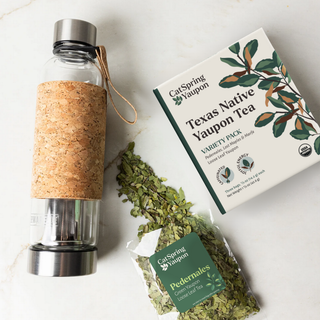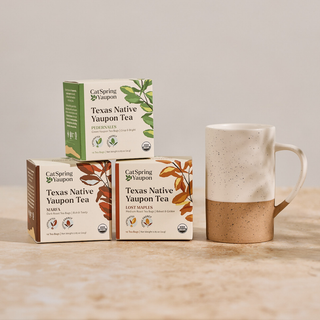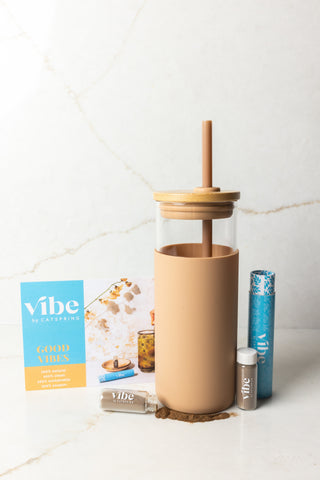Teas Singers Reach For
Preparing for a performance involves more than warming up your voice. Staying hydrated, managing nerves, and keeping your throat comfortable all play a role—especially when congestion, dryness, or fatigue show up at the wrong time.
For many singers, tea becomes part of that preparation. Not as a cure-all, but as a steady, supportive ritual—something warm, gentle, and familiar before stepping on stage.
Here are seven teas singers often reach for, starting with one that’s uniquely easy on the throat.
1. Yaupon Tea
Smooth energy without dryness or bitterness
Yaupon is America’s only native caffeinated plant, traditionally brewed for centuries and naturally smooth in character. Unlike many traditional teas, yaupon contains little to no tannins, which means it doesn’t leave the mouth feeling dry or astringent—something singers often try to avoid.
It offers a gentle lift without the sharp spike or crash of coffee, making it a thoughtful option before rehearsals or performances.
Why singers like it:
-
Smooth, non-bitter brew
-
Gentle, steady energy
-
Easy to sip without drying the throat
Best enjoyed: warm or lightly cooled, plain or with a touch of honey
2. Ginger Tea
Warming and grounding

Ginger tea has long been used as a comforting, warming drink. Its bold, familiar flavor makes it a popular choice when the throat feels overworked or the body needs settling before a performance.
Many singers enjoy ginger tea with honey as part of a pre-show routine.
Why singers reach for it:
-
Naturally warming
-
Familiar, comforting flavor
-
Pairs well with honey
3. Chamomile Tea
Calm, gentle, and evening-friendly

Chamomile is known for its calming qualities and light floral flavor. For singers dealing with pre-performance nerves or winding down after a show, chamomile can feel especially supportive.
Because it’s caffeine-free, it’s often reserved for evening rehearsals or post-performance routines.
Why singers enjoy it:
-
Gentle and soothing
-
Light, easy-drinking flavor
-
Supports relaxation
4. Licorice Root Tea
Throat-coating and comforting

Licorice root tea has a naturally sweet flavor and is often described as “throat-coating,” which is why singers sometimes turn to it when their voice feels strained or dry.
It’s best enjoyed occasionally rather than daily, especially in moderation.
Why singers use it:
-
Naturally soothing mouthfeel
-
Comforting warmth
-
Often blended with other herbs
5. Peppermint Tea
Clear and refreshing

Peppermint tea offers a crisp, cooling sensation that many singers enjoy when congestion or heaviness is present. Its refreshing aroma and flavor can feel clarifying before vocal warmups.
That said, some singers avoid it if they’re sensitive to reflux.
Why singers like it:
-
Fresh, clean taste
-
Cooling sensation
-
Helps you feel clear and awake
6. Green Tea
Light, focused energy

Green tea provides a lighter caffeine lift than coffee and is often appreciated for its clean taste. Because it does contain tannins, singers typically steep it briefly and sip mindfully.
Why singers choose it:
-
Light caffeine support
-
Fresh, vegetal flavor
-
Familiar option for tea drinkers
7. Ginseng Tea
Traditionally used for stamina

Ginseng tea has a long history of use and is often associated with energy and endurance. Some singers enjoy it during long rehearsal periods when stamina matters.
Its flavor is earthy and distinct, making it more of an acquired taste.
Why singers explore it:
-
Traditionally associated with vitality
-
Earthy, grounding character
-
Often used occasionally rather than daily
The Bottom Line
Singing is personal, and so is preparation. The best tea for singers is one that feels supportive rather than distracting—hydrating, gentle, and easy to return to.
Whether you reach for something calming, warming, or lightly energizing, tea can be a steady companion before the lights come up and the first note is sung.
For singers looking for smooth energy without bitterness or dryness, yaupon offers a uniquely gentle place to start.

Medical Disclaimer
This article is for informational purposes only and is not intended as medical advice. Individual responses may vary. Please consult a healthcare professional with specific health concerns.













